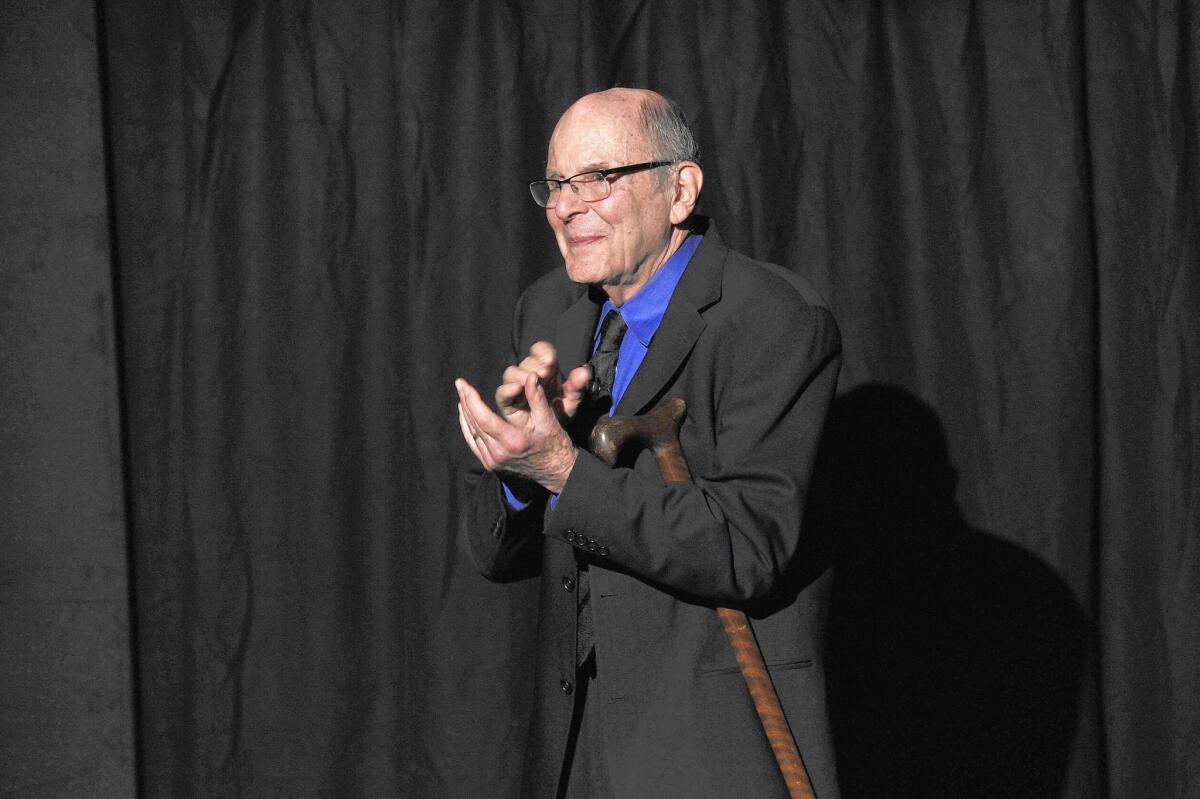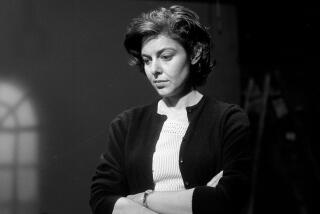Stewart Stern dies at 92; screenwriter behind ‘Rebel Without a Cause’

Stewart Stern, an Oscar-nominated writer whose screenplay for “Rebel Without a Cause” helped turn James Dean into an enduring symbol of alienated youth, died Monday at a Seattle hospital. He was 92.
The cause was cancer, according to the Writers Guild of America, West, which announced his death.
During more than a quarter-century in Hollywood, Stern became known for the psychological depth of his screenwriting. His credits include “Rachel, Rachel,” a 1968 film directed by Paul Newman and starring Joanne Woodward as a lonely, repressed schoolteacher, and “Sybil,” the 1976 miniseries starring Sally Field as a woman suffering from multiple personality disorder.
“Sybil” brought him an Emmy for best dramatic writing in 1977, and “Rachel, Rachel” earned him an Oscar nomination.
“Stewart’s words give an actor a kind of emotional depth that you can just ride on, like a wave. He certainly stacks up as one of the best in our business,” Newman told the Seattle Times in 1996.
Stern also wrote the screenplay for the Vietnam War-era film “The Ugly American” (1963), which starred Marlon Brando as the American ambassador in a Southeast Asian country torn by civil war, and the critically praised “Summer Wishes, Winter Dreams” (1973), also starring Woodward, who played a middle-aged homemaker in crisis.
A frequent lecturer at USC until he moved to Seattle in 1986, Stern taught screenwriting at the University of Washington and at TheFilmSchool, a nonprofit institute he co-founded in 2005 with actor Tom Skerritt.
Stern stressed to his students the importance of finding a personal connection to the stories they wanted to write for the screen. He said that was key to his success with the 1955 landmark, “Rebel Without a Cause.”
“I realized it was a story about me, as everything I’ve ever done turned out to be,” Stern, in a 2011 interview for the El Paso Times, said of his best-known work.
“Rebel” was a portrait of juvenile delinquents and the family dysfunction that marred their prospects for happiness. It starred Dean, fresh from his success in “East of Eden,” as a teenager whose efforts to fit in at his new school lead to tragedy.
Stern, who was born in New York on March 22, 1922, grew up as a “sheltered Jewish doctor’s boy” with artistic leanings. His father was medical director at Paramount, which was co-founded by Stern’s uncle, Adolph Zukor; his mother was a former actress.
In “Going Through Splat: The Life and Work of Stewart Stern,” a 2005 documentary directed by Jon Steven Ward, Stern tells of the pain of being an unwanted child — his mother tried to abort him — and the psychological suffering that drove him into decades of therapy.
He studied art at the University of Iowa, where he joined the ROTC. When World War II began, he entered the Army, fighting in the 106th Infantry Division.
Friendships forged under the duress of battle taught him lessons that proved valuable in his screenwriting.
He recalled in particular how he helped calm another soldier at the start of the Battle of the Bulge.
“I knew that he liked to draw horses and cowboys,” Stern said in a 1999 interview in Michigan Quarterly, so “we stood in that trench full of freezing water with everything coming at us, and I showed him how to draw a horse in a rodeo scene.
“I’d learned in the Army that I didn’t have to abandon who I was — an artist,” Stern said. “I discovered that everyone, no matter how much tough armor he’s created around himself, is, fundamentally, a sensitive, responsive person who needs just as much reassurance as the rest of us. And that gave me a great deal of strength and insight, and it also informed my writing of ‘Rebel’ — especially this whole question of the masks we feel we need to wear in front of others — and what exactly defines a ‘man.’”
Stern, who killed three German soldiers, survived an extreme case of frostbite and for a while was missing in action, was decorated for his service.
After the war, he got his start in the movie business through family ties. Aside from Zukor, he was related to the Loews of MGM and the Loew’s theater chain. He met director Fred Zinnemann, who hired him to write “Benjy,” his Oscar-winning 1951 short documentary about a disabled youngster. That led to Stern scripting Zinnemann’s “Teresa,” a 1951 film about a troubled American soldier that earned Stern his first Oscar nomination.
Stern met Dean at a party at cousin Arthur Loew Jr.’s house. “Jimmy and I laughed at the same things and he’d try to shock me and vice-versa,” Stern recalled in the Canadian newspaper Times Colonist. “He was just one of those people you find irresistible, but he could also be quite mischievous.”
They knew each other for barely a year before Dean died in a head-on collision on his way to Salinas on Sept. 30, 1955, just before “Rebel” was released.
Among Stern’s last credits was the aptly titled “The Last Movie,” a 1971 collaboration with Dennis Hopper, who’d had a small part in “Rebel Without a Cause.” The quasi-Western was a huge critical and commercial flop.
By the early 1980s Stern was finished with Hollywood. He “hated the fact that I’d left my friends and walked out on my career,” he told the Seattle Times in 1996. “I knew, though, that if I was ever going to write again, it would have to come out of a different place.”
He moved to Seattle when his wife, ex-ballerina Marilee Stiles Stern, was invited to teach at the Pacific Northwest Ballet. She survives him.
[email protected]
Twitter: @ewooLATimes
More to Read
Start your day right
Sign up for Essential California for the L.A. Times biggest news, features and recommendations in your inbox six days a week.
You may occasionally receive promotional content from the Los Angeles Times.







